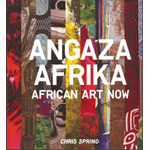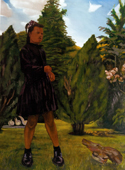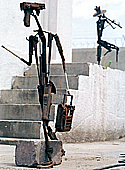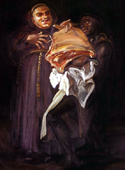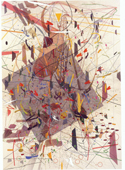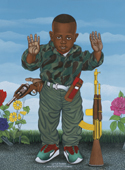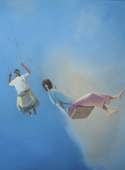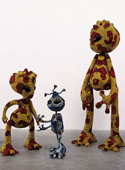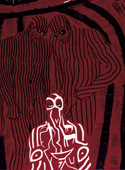Chris
Spring's new book on African art is a 336-page compendium
of contemporary practice in Africa.The brief introductory
section showcases group practices from communities such as
the Fantasy Coffins of Teshie, Ghana, and other art movements
from East, through West, to North Africa.
However, the book is primarily
about individual artists, the major thrust of the book being
to introduce the reader to the author's view of African art.
For a book that attempts to cover continental Africa with
a sampling of the works of some 63 artists, this can only
be a personal collection, speaking as much to the taste of
the curator as to the variety of the art on the continent.
This is especially so because the artists featured are sometimes
no longer working in Africa. Yet, the work that has been assembled
within these pages depicts a comprehensive mix of paintings,
sculptures, installations and performance art from an intensely
vigorous pantheon. Bruce Onobrakpeya, El Anatsui, Chris Ofili..
Those who come to this book with entrenched ethnographic expectations
from African art will have their sop, but the collected artists
have moved in quirkily distinct directions with both brilliance
and individuality.
The quality of the art reproductions
succeed for the coffee-table, but the insightful commentaries
that accompany them also provide a sustained philosophy of
art as the artists grapple with all the big issues. The 7
million idle guns left over after the Mozambican civil war
engage four artists, Kester, Fiel dos Santos, Hilario Nhatugueja
and Adelino Mate, who worked on Bishop Sengulane's Swords
into Ploughshares project, recycling small arms. The
work of South African artist Willie Bester is also consciously
political - from the recycled metal sculpture, For Those
Left Behind, and the vigorous mixed-media piece, Transition.
Congolese, Cheri Samba explores this tradition with his
Little Kadogo (Child Soldier) and La Chulte du 3e
Baobab. Yet, the haunting pieces are intensely personal. -
Like the dreaminess of Gemuce's Grandmother and Granddaughter,
or the regal, sphinxlike intricacy of Mohamed Bushara's
Untitled, 2006 etching - which was also the cover
art of  's
debut
print edition. 's
debut
print edition.
The icons of
African art are represented here alongside their less famous
- and by this evidence - not less talented compatriots. From
Jane Alexander's unsettling mannequins to Yinka Shonibare's
hilarious ones. From Algeria, through Sudan to Uganda... it
is barely possible to take the pulse of African art in 336
pages but Chris Spring has done so sensitively and with curatorial
flair in this important book.  |











![]()
![]()

